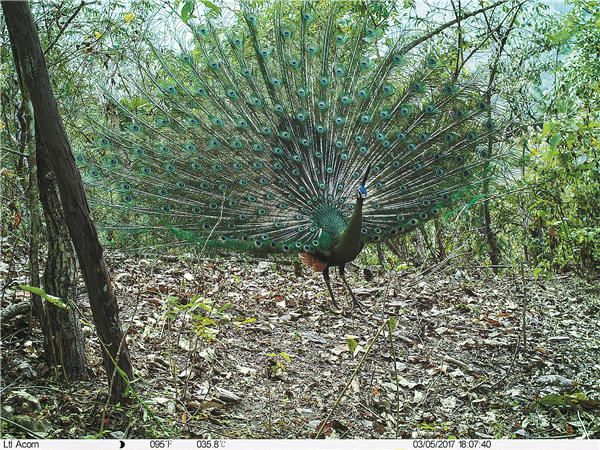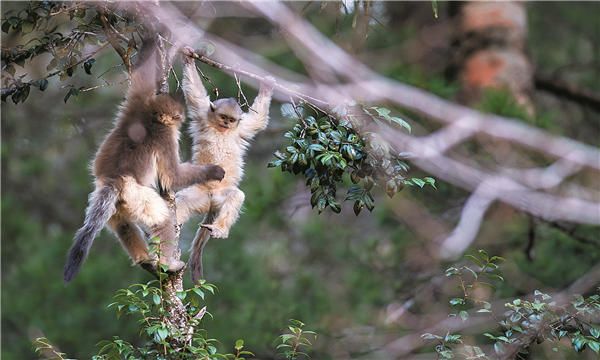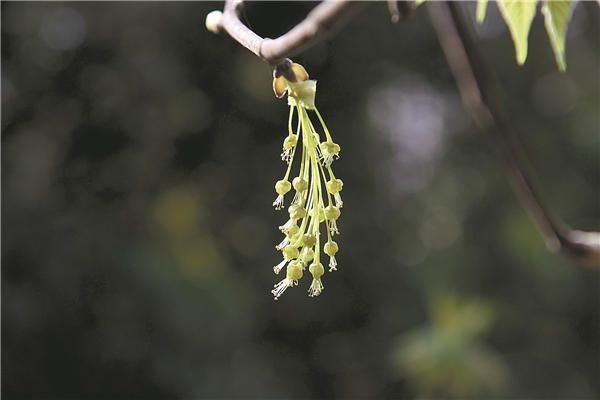Yunnan protects its wild side

Elephants, peafowl and elusive maples given the chance to thrive in China's most biodiverse province
According to the fifth Global Biodiversity Outlook report, biodiversity is declining at an unprecedented and intensifying rate. As the most biodiverse province in China, southwestern Yunnan is sharing its conservation strategy on the international stage.
Seventeen years after the province first introduced the concept of Species with Extremely Small Populations (SESP), Yunnan showcased its achievements in conservation on Dec 16 at a side event of the 15th meeting of the Conference of the Parties (COP15) to the UN Convention on Biological Diversity in Montreal, Canada.
"We will forever lose the opportunity for future development brought by some species if they go extinct," says Yang Hua, an official with the provincial forestry and grassland administration.
SESP was put forward by the province in 2005, as a concept to denote species that were found to be restricted in their geographic distribution and which showed weak population growth.
Ever since then, the province's conservation efforts have helped the population of Asian elephants reach around 360, and that of black-and-white snub-nosed monkeys is now 3,800.
Sun Weibang, director of the Kunming Botanical Garden, under the Kunming Institute of Botany of the Chinese Academy of Sciences, said that, during a decade of continuous development, Plant Species with Extremely Small Populations (PSESP), a term derived from SESP, was applied as a conceptual model to conserve native plants in countries such as Italy, Russia, Mexico, and Iraq.

Habitats protected
To conserve animal SESP, project developers were asked to involve animal habitats in their planning decisions by undertaking measures such as setting up ecological corridors, and building bridges and tunnels to facilitate the dispersal of animals.
One of the most iconic animals in the province, the green peafowl is listed as an endangered species on the International Union for Conservation of Nature's Red List, due to the rapid decline of its population, which stands at 600 in the province.
In December 2020, the Yunnan High People's Court ruled that the construction of a hydropower station on the Jiasa River should be suspended as it posed a possible threat to the habitat of green peafowl in the Konglonghe Nature Reserve in Shuangbai county, Chuxiong Yi autonomous prefecture.
The Yunnan case involving the green peafowl was the first such case of public interest litigation in China.
The Asian elephant, which is also under protection as a SESP, saw a "baby boom" in nearly every elephant herd during recent years, demonstrating the success of China's arduous protection efforts — especially important given that the population of the Asian elephant is showing a declining trend globally.
To elevate its conservation efforts, the province developed monitoring and early-warning systems for the giant creature by synchronizing information collected by methods such as infrared cameras, video monitoring and satellite positioning, and visualizing them on a specific mobile phone app installed on the phones of villagers living nearby.
Currently, there are 11 nature reserves for Asian elephants, covering an area of nearly 5,100 square kilometers, and the province has established around 800 hectares of "food stores" for elephants, said Wan Yong, director of the provincial forestry and grassland administration.
According to Wan, the Xishuangbanna Asian Elephant Rescue and Breeding Center has rescued 30 trapped, injured, or sick wild elephants in the past 20 years. China has also set up cooperative mechanisms, sharing conservation knowledge and technical training with neighboring countries such as Laos.

A tree reborn
After years of practice, Yunnan has formulated specific technical guidance for PSESP conservation, including methods such as in-situ, ex-situ, and near-situ conservation.
Before 2016, only five Acer yangbiense — a rare species of maple — had been discovered in Yunnan. They were found in 2001 by a PhD student from the Kunming Institute of Botany, Chinese Academy of Sciences.
At that time, only two of the discovered samples were able to propagate, so the new species was subsequently included as one of the 20 endangered species that require immediate protection in the province's conservation plan for SESP.
The nearby Malutang village was approached for assistance in the Acer yangbiense rescue efforts, and the village chief was tasked with ensuring protection for this plant.
With the help of the village chief, researchers from the botany institute were able to make a scientific breakthrough — they managed to artificially breed over 1,600 seedlings.
By analyzing the genetic diversity of the artificially-germinated seedlings and the five wild plants, researchers noted that even though all the seedlings were propagated from one of the five wild plants, there was pollen present from plants other than the five plants they had discovered.
Researchers thus expanded their search for more wild Acer yangbiense, and found 572 wild plants in 2016.
With the aid of the new plants, a total of 50,000 new seedlings were successfully reproduced.
"There is no doubt that our rescue effort has demonstrated effective coordination among relevant authorities, research institutes, and local communities," said Sun.

Acer yangbiense, a rare species of maple. [Photo/Xinhua]
专业会员
| 我也说两句 |
| 版权声明: 1.依据《服务条款》,本网页发布的原创作品,版权归发布者(即注册用户)所有;本网页发布的转载作品,由发布者按照互联网精神进行分享,遵守相关法律法规,无商业获利行为,无版权纠纷。 2.本网页是第三方信息存储空间,阿酷公司是网络服务提供者,服务对象为注册用户。该项服务免费,阿酷公司不向注册用户收取任何费用。 名称:阿酷(北京)科技发展有限公司 联系人:李女士,QQ468780427 网络地址:www.arkoo.com 3.本网页参与各方的所有行为,完全遵守《信息网络传播权保护条例》。如有侵权行为,请权利人通知阿酷公司,阿酷公司将根据本条例第二十二条规定删除侵权作品。 |
 m.quanpro.cn
m.quanpro.cn


